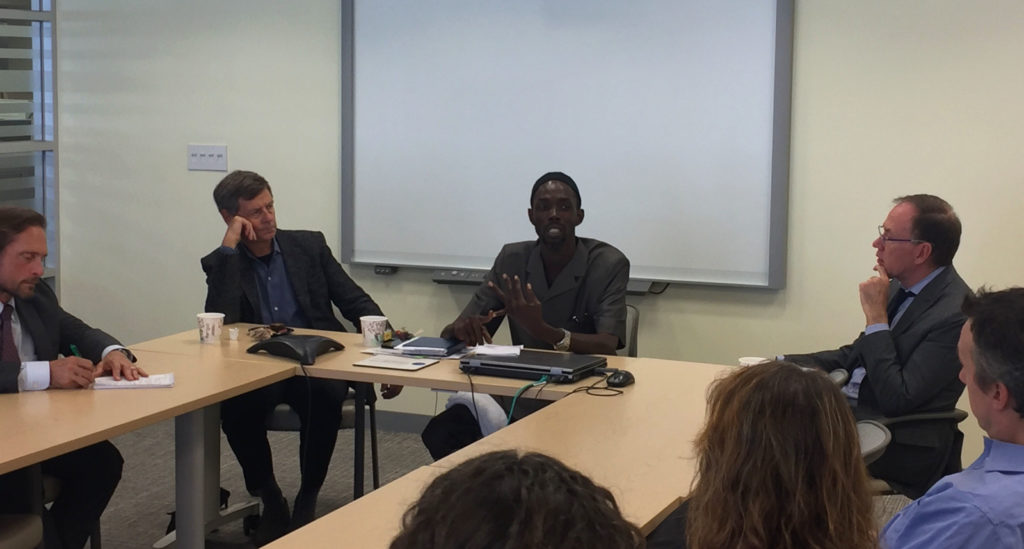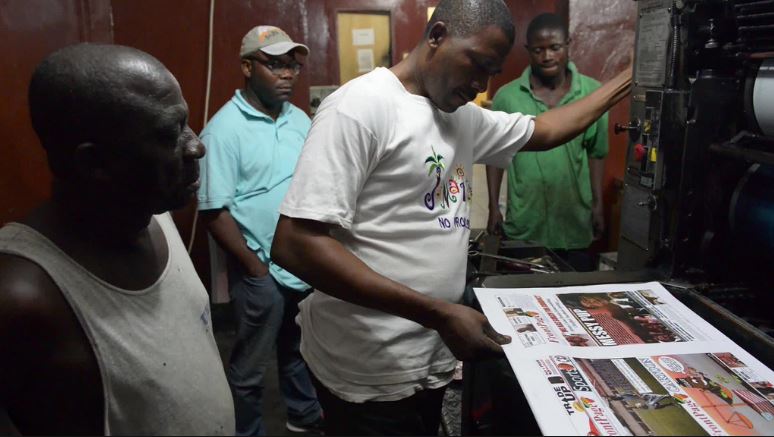By Dave Peterson
The Press Union of Liberia (PUL) has fought for press freedom in Africa as long or longer than just about any other civil society organization on the continent. Founded in 1964, it claims a membership of more than 500 journalists. Abdullai Kamara, the PUL’s president for the past three years, recently visited with CIMA and National Endowment for Democracy (NED) staff in Washington, providing an opportunity for him to share with us his assessment of Liberia’s upcoming national elections and the role the press plays in championing democracy and human rights.
Since the incumbent president, Ellen Johnson-Sirleaf, is stepping down in early 2018, Liberia’s 2017 elections will be the first peaceful transition of leadership since the Tubman era more than 40 years ago, and will be fiercely competitive. The UN Mission (UNMIL) will no longer be providing peacekeepers, nor will it be available to provide logistical support, such as helicopters. Liberia’s armed forces remain of questionable reliability, and the current Minister of Defense has declared his partisanship. Meanwhile, the media has its own challenges, including reform of media laws and the decriminalization of speech, and the need to establish a public broadcasting service and an independent press regulatory authority. Liberia has passed a strong Freedom of Information Act, but its implementation has been lacking.

Abdullai Kamara from the Press Union of Liberia speaks about the current press freedom situation in Liberia to a group of invited guests at the National Endowment for Democracy.
Although President Johnson-Sirleaf has endorsed the Table Mountain Declaration, which calls for the ending of criminal libel laws in Africa, journalists in Liberia are still being prosecuted with such laws that remain on the books. If they can’t be repealed, at least they shouldn’t be applied, Abdullai suggested. Just recently a newspaper had reported that a member of parliament had raped a girl-child, but instead of investigating and prosecuting the MP, the newspaper publisher was jailed. Another journalist, Festus Pakoe, was recently arrested off the street for having republished an article criticizing Obiang Nguema, the president of Equatorial Guinea, a country notorious for corruption. President Johnson-Sirleaf, it seems, was sensitive about offending her fellow heads of state. “Such actions frighten me,” Abdullai said. In the context of the upcoming elections, two opposition radio stations have been closed down, ostensibly for failing to meet regulatory requirements, but this could have been dealt with by other means, he insisted.
Media law reform initiatives, including draft legislation, have gotten nowhere. If the government supported a more liberal media environment, it would improve the government’s image internationally, Abdullai said. PUL has long advocated that the most effective guarantee of media professionalism is peer censure. PUL’s grievance and ethics committee has imposed sanctions on journalist offenders, but shutting down a media house or ending a journalist’s career is excessive. Abdullai said that journalists’ recklessness was most often due to lack of capacity and understanding, and that PUL’s role is to empower them to be better journalists. A growing problem hampering media development in Liberia is the commercialization of the media; many newspapers and radio simply reproduce government or party propaganda for a fee. Despite all this, “bad speech is trumped by more speech,” he said.
The government is always trying to control the media. Community radio doesn’t belong to the government, and its independent management should be able to discuss the elections in a nonpartisan way. Government is the second largest advertiser after Celcom, a telecommunications company. Circulation of the largest newspapers is only 1,500, and few Liberians can afford to buy them. Thus, because papers survive on advertising, if the government is unhappy with them and withdraws its advertising, it hurts.
During the Ebola crisis, the government had issued a curfew and declared that journalists had to get its permission to cover the issue. The stumbling government response to the crisis and ensuing protests led to a reversal of the policy, enabling the media and civil society to mobilize a more effective outreach to the population that proved critical to getting the crisis under control.
As Liberia prepares for a political transition, the press has an important role to play in informing the citizenry and holding politicians to account. The PUL is calling for a media code of conduct for election coverage. During the 2011 election, the ruling Unity Party bought 72 hours of time on local radio stations, but the opposition had none. Several radio stations were closed down and accused of hate speech in 2011, but no evidence was ever produced that this had occurred.
The PUL officially observed elections in Liberia in 1997, 2005, 2011, and 2014. The PUL is working with other NGOs in the Deepening Democracy Coalition, which will monitor campaign finance, conduct parallel vote tabulation, and survey the concerns of Liberian citizens through public opinion polling. The coalition is calling for candidates to declare their assets. The PUL also hopes to train journalists to cover and report on the elections, not only to provide quality stories and keep the public engaged in the process, but to be sensitive to conflict and limit hate speech. Through its long-standing Edward Wilmot Blyden Forum, the PUL intends to continue its tradition of candidate debates and public discussion of issues.
Liberia has made positive advances in the area of press freedom recently, but Abdullai’s visit underscored the amount of work that is left to be done and how important this is to Liberia’s long-term commitment to democracy and human rights. There is no doubt that the PUL will continue to be at the forefront of such advocacy.
Dave Peterson is Senior Director for the Africa Program of the National Endowment for Democracy.


Comments (0)
Comments are closed for this post.